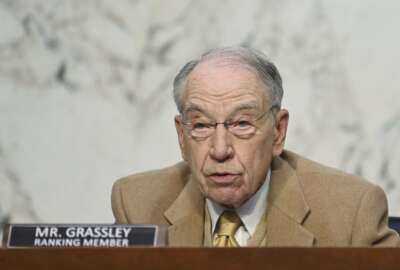ATF misclassified jobs, improperly paid out law enforcement benefits, audit finds
The Bureau of Alcohol, Tobacco, Firearms and Explosives misclassified more than 90 administrative positions as law enforcement jobs — and provided special premium...
The Bureau of Alcohol, Tobacco, Firearms and Explosives improperly classified some 90 administrative positions as law enforcement jobs, prompting an audit from the Office of Personnel Management and a recent investigation from a top-ranking Senate Republican.
OPM conducted a human capital management evaluation of ATF’s performance management system last fall. The audit uncovered “approximately 94 positions” that were improperly classified to the General Schedule 1800 law enforcement occupational family.
The employees assigned to the positions in question performed administrative duties only — and should have been part of human resources, public affairs or other General Schedule occupations, OPM said in a November 2020 letter to ATF, which Sen. Grassley (R-Iowa) made public last week.
“The evaluation team’s fact-finding concluded that individuals in ATF with delegated authority to conduct and approve positions classification activities on behalf of the Justice Department established these position descriptions to assign approximately 94 ATF personnel to GS 1800 positions,” Mark Lambert, OPM’s associate director for merit system accountability and compliance, said in the letter. “These actions were taken without regard for the 1800 classification standards for law enforcement officers, and without consideration of the qualifications requirements of the administrative positions.”
Certain criminal investigators and others in the 1800 job series are traditionally eligible for law enforcement availability pay, or LEAP, which is designed to compensate federal employees for the activities they do beyond their traditional work hours. LEAP benefits are worth up to 25% of an employee’s base salary, and law enforcement officers are supposed to be available for calls that come outside of unscheduled work hours.
Grassley, the ranking member of the Senate Judiciary Committee, said his office is aware of ineligible employees receiving LEAP benefits. He said he’s investigating what he described as “mismanagement and government waste of taxpayer dollars.”
In an email to Federal News Network, ATF said it ultimately misclassified a total of 91 positions to the law enforcement job category, per OPM’s audit.
“Not all employees assigned to those positions were receiving Law Enforcement Availability Pay (LEAP), and some of the identified positions were unencumbered,” April Langwell, an ATF spokeswoman, said.
In response to its findings, OPM partially suspended ATF’s position classification authority last November. That means ATF can still draft position descriptions and recommend a classification on the General Schedule to assign them to, but OPM must approve those designations first.
In its November letter, OPM also said it would refer the agency to the Office of Special Counsel for “investigation of prohibited personnel practices ATF may have committed in taking these actions.”
“Clearly OPM believed this to be a serious matter given the referral to OSC and the fact that the agency chose to copy the DOJ inspector general on the letter,” Grassley wrote last week in his own letter to Attorney General Merrick Garland and Marvin Richardson, the acting ATF director. “The fact that DOJ and ATF took action in response to that letter further shows that DOJ agreed that a problem existed.”
Grassley’s letter also detailed allegations from an ATF whistleblower, who he said raised concerns about how the agency had classified certain positions. The whistleblower has been fired from his or her position and believes the agency did so in retaliation for raising those concerns, Grassley said.
“This situation seems particularly egregious in that the whistleblower in question apparently came forward at ATF after attending a larger meeting where whistleblowing was praised and even featured a previous whistleblower,” Grassley wrote. “ATF, the Department of Justice and the whole government ought to celebrate whistleblowers, and not just seek to appear to celebrate whistleblowers, as the case appears in this instance.”
The whistleblower’s case is at the Merit System Protection Board, Grassley added. OSC reviewed the whistleblower’s disclosure and found “a substantial likelihood of wrongdoing,” according to a June 2020 letter that Grassley also made public. OSC referred the matter back to the Justice Department for investigation.
Grassley has asked DOJ and ATF for a status update on that investigation, as well as more details about the misclassified positions and the LEAP benefits the employees received. He sent a similar letter to OPM looking for more details on its audit.
ATF declined to comment on the contents of Grassley’s letter. But it did confirm ATF’s position classification authority is still suspended.
“ATF has been the subject of an audit with regard to classifications that affected a number of headquarters positions,” Langwell said. “ATF has and continues to work cooperatively with the Department of Justice and the Office of Personnel Management to come to a resolution of these matters. We are committed to being in compliance with all OPM policies and procedures.”
ATF gave impacted employees the option of being reassigned to properly-classed law enforcement positions. They can also stay in their current jobs, as long as they meet the qualifications of the properly reclassified positions, Langwell said.
Grassley’s documents include a May 2021 memo from ATF’s human resources and professional development division, which referenced the OPM audit and asked employees to indicate their preferences about the next course of action. The agency gave employees the choice of staying within their current position, transferring to another position or retiring.
In staying within the current position or transferring, employees acknowledged they “may retain [their] series, grade and step and that [they] may or may not remain in the National Capital Region,” the memo stated.
When asked, ATF didn’t specify how many employees had chosen to pursue their same positions or transfer to new ones. The agency said it didn’t have the data available.
Copyright © 2025 Federal News Network. All rights reserved. This website is not intended for users located within the European Economic Area.
Nicole Ogrysko is a reporter for Federal News Network focusing on the federal workforce and federal pay and benefits.
Follow @nogryskoWFED






